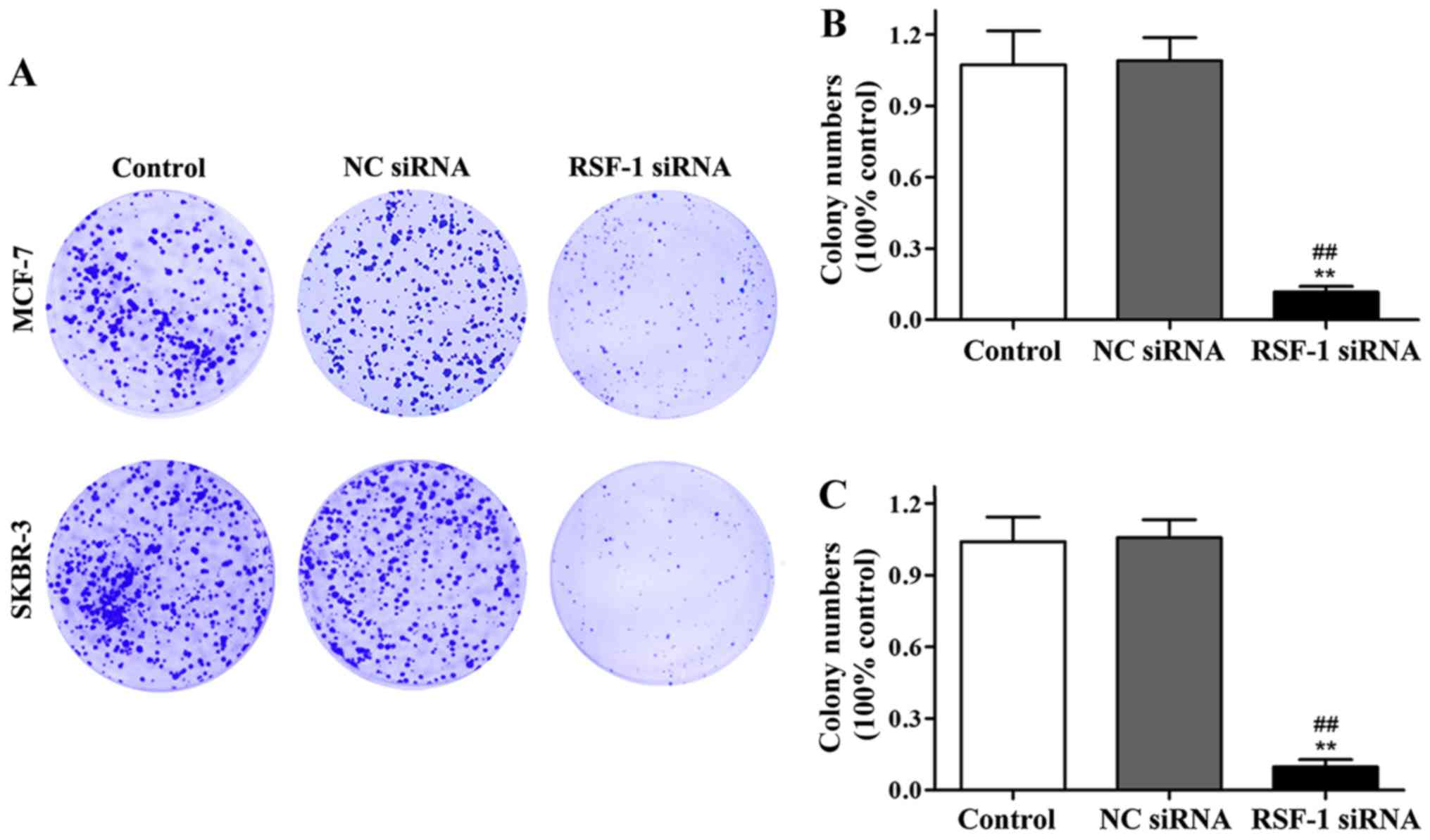|
1
|
Hu Z, Mao JH, Curtis C, Huang G, Gu S,
Heiser L, Lenburg ME, Korkola JE, Bayani N, Samarajiwa S, et al:
Genome co-amplification upregulates a mitotic gene network activity
that predicts outcome and response to mitotic protein inhibitors in
breast cancer. Breast Cancer Res. 18:702016. View Article : Google Scholar : PubMed/NCBI
|
|
2
|
Siegel R, Naishadham D and Jemal A: Cancer
statistics, 2012. CA Cancer J Clin. 62:10–29. 2012. View Article : Google Scholar : PubMed/NCBI
|
|
3
|
Chen WQ, Zeng HM, Zheng RS, Zhang SW and
He J: Cancer incidence and mortality in China, 2007. Chin J Cancer
Res. 24:1–8. 2012. View Article : Google Scholar : PubMed/NCBI
|
|
4
|
Macià F, Porta M, Murta-Nascimento C,
Servitja S, Guxens M, Burón A, Tusquets I, Albanell J and Castells
X: Factors affecting 5- and 10-year survival of women with breast
cancer: An analysis based on a public general hospital in
Barcelona. Cancer Epidemiol. 36:554–559. 2012. View Article : Google Scholar : PubMed/NCBI
|
|
5
|
Jones C, Ford E, Gillett C, Ryder K,
Merrett S, Reis-Filho JS, Fulford LG, Hanby A and Lakhani SR:
Molecular cytogenetic identification of subgroups of grade III
invasive ductal breast carcinomas with different clinical outcomes.
Clin Cancer Res. 10:5988–5997. 2004. View Article : Google Scholar : PubMed/NCBI
|
|
6
|
Bange J, Zwick E and Ullrich A: Molecular
targets for breast cancer therapy and prevention. Nat Med.
7:548–552. 2001. View
Article : Google Scholar : PubMed/NCBI
|
|
7
|
Shamay M, Barak O and Shaul Y: HBXAP, a
novel PHD-finger protein, possesses transcription repression
activity. Genomics. 79:523–529. 2002. View Article : Google Scholar : PubMed/NCBI
|
|
8
|
Hu BS, Yu HF, Zhao G and Zha TZ: High
RSF-1 expression correlates with poor prognosis in patients with
gastric adenocarcinoma. Int J Clin Exp Pathol. 5:668–673.
2012.PubMed/NCBI
|
|
9
|
Liu S, Dong Q and Wang E: Rsf-1
overexpression correlates with poor prognosis and cell
proliferation in colon cancer. Tumour Biol. 33:1485–1491. 2012.
View Article : Google Scholar : PubMed/NCBI
|
|
10
|
Lin CY, Tian YF, Wu LC, Chen LT, Lin LC,
Hsing CH, Lee SW, Sheu MJ, Lee HH and Wang YH: Rsf-1 expression in
rectal cancer: with special emphasis on the independent prognostic
value after neoadjuvant chemoradiation. J Clinl Pathol. 65:6872012.
View Article : Google Scholar
|
|
11
|
Xie C, Fu L, Xie L, Liu N and Li Q: Rsf-1
overexpression serves as a prognostic marker in human
hepatocellular carcinoma. Tumour Biol. 35:7595–7601. 2014.
View Article : Google Scholar : PubMed/NCBI
|
|
12
|
Zhang X, Xu H, Gao Q, Jiang H and Li Q:
The expression and significance of Rsf-1 in hepatocellular
carcinoma. J Moder Oncol. 1:98–100. 2016.
|
|
13
|
Li Q, Dong Q and Wang E: Rsf-1 is
overexpressed in non-small cell lung cancers and regulates cyclin
D1 expression and ERK activity. Biochem Biophys Res Commun.
420:6–10. 2012. View Article : Google Scholar : PubMed/NCBI
|
|
14
|
Livak KJ and Schmittgen TD: Analysis of
relative gene expression data using real-time quantitative PCR and
the 2(-Delta Delta C(T)) method. Methods. 25:402–408. 2001.
View Article : Google Scholar : PubMed/NCBI
|
|
15
|
Chan SW, Lim CJ, Guo K, Ng CP, Lee I,
Hunziker W, Zeng Q and Hong W: A role for TAZ in migration,
invasion, and tumorigenesis of breast cancer cells. Cancer Res.
68:2592–2598. 2008. View Article : Google Scholar : PubMed/NCBI
|
|
16
|
Sheu JJ, Choi JH, Yildiz I, Tsai FJ, Shaul
Y, Wang TL and Shih IeM: The roles of human sucrose nonfermenting
protein 2 homologue in the tumor-promoting functions of Rsf-1.
Cancer Res. 68:4050–4057. 2008. View Article : Google Scholar : PubMed/NCBI
|
|
17
|
Loyola A, Huang JY, LeRoy G, Hu S, Wang
YH, Donnelly RJ, Lane WS, Lee SC and Reinberg D: Functional
analysis of the subunits of the chromatin assembly factor RSF. Mol
Cell Biol. 23:6759–6768. 2003. View Article : Google Scholar : PubMed/NCBI
|
|
18
|
Flanagan JF and Peterson CL: A role for
the yeast SWI/SNF complex in DNA replication. Nucleic Acids Res.
27:2022–2028. 1999. View Article : Google Scholar : PubMed/NCBI
|
|
19
|
Cosma MP, Tanaka T and Nasmyth K: Ordered
recruitment of transcription and chromatin remodeling factors to a
cell cycle- and developmentally regulated promoter. Cell.
97:299–311. 1999. View Article : Google Scholar : PubMed/NCBI
|
|
20
|
Hausheer FH and Yarbro JW: Diagnosis and
treatment of malignant pleural effusion. Semin Oncol. 12:54–75.
1985.PubMed/NCBI
|
|
21
|
Martínez-Moragón E, Aparicio J, Sanchis J,
Menéndez R, Cruz Rogado M and Sanchis F: Malignant pleural
effusion: Prognostic factors for survival and response to chemical
pleurodesis in a series of 120 cases. Respiration. 65:108–113.
1998. View Article : Google Scholar : PubMed/NCBI
|



















